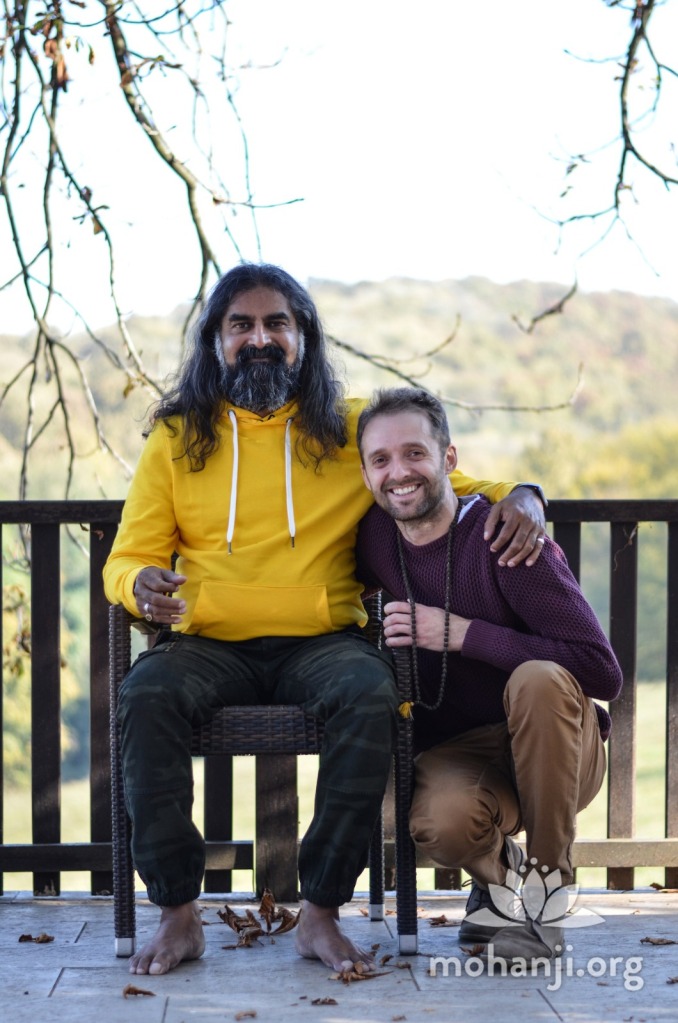By Christopher Greenwood
Day 2 lesson – Mother and Father
I hope you enjoyed the recording yesterday, which is one of the practical lessons I’ve picked up from Mohanji. “No delay. No postponement. No tomorrow. It’s now.” Today, I wanted to share a little bit more about the Mohanji home, and a living lesson from how Mohanji looks after his parents.
Today I wanted to look at the idea of home and family, around that theme. Yesterday’s lesson was very practical, around not delaying. And today I wanted to give more of a view on living with Mohanji. Because whilst he has a very straightforward, no nonsense, matter of fact approach when it comes to work and activity, and moving forward with the activities across the Foundation, he brings the same dedication and commitment to all of his responsibilities, whether that’s a husband, a father, or a son. Here in the home, I’ve had the opportunity to spend time and observe that too.
I call it a home because I was invited to come, as I was somewhat stranded here in India because of Covid. I had just started this role, so it made sense that we were closer together for practical purposes. As you could imagine, being invited to come and stay, I was really nervous at first. I didn’t know what to expect, or what to do, and I hadn’t really had much one to one contact time with Mohanji himself up until that point. Although I’d attended various retreats, and I’d spoken to him here and there, a few words or a few conversations, but nothing really more than that. So, to think about coming, and staying with him in close proximity, I was very nervous. And I think in the first weeks and days I would have been very, very stiff. But quite soon, the warm and the accepting nature that he has, and no expectations of how I should or shouldn’t be, completely allowed me to be myself.
Quite quickly I just relaxed into being a part of the home, and part of the atmosphere and it’s a really lovely harmonious atmosphere. The home itself is a modest size. It has a nice ring of Tulsi plants that have been planted outside by Rajesh and some of the gardeners. I didn’t know but apparently the Tulsi has an aura eight times the size of the actual plant, so that gives a real nice feel. And Rajesh diligently waters them with the coherent water each morning. There’s a section setup where there are some tomato plants growing, and I think some fruit trees have been planted too.
So it’s really nice outside. When you come inside, there is the main hall or the main room where Mohanji sits. On the wall, you have Sai Baba, Dattatreya, Babaji, a picture of Krishna, and other Datta Masters. This leads to an open space to the eating area where there’s a puja room, and there is a kitchen, and a bedroom, and some bedrooms upstairs as well. So, it’s a really nice family home and that’s the feel that it has. I’m pretty sure that when the ashram space is set up or the centres of benevolence like on the land in Ganeshpuri, they will welcome everybody similarly. Even the general environment is very harmonious. The only expectation from you is that you help clean and keep the maintenance of the place. This is for all to get a bit more of a picture of what it’s like here.
It’s from the family or the home that I want to share a lesson today from Mohanji. Mohanji doesn’t overly say something as a teaching. Generally, the way he acts, the way he lives, is a lesson in itself. How he behaves, if you observe him closely enough, you’ll be able to pick up some really great insights and lessons. And here in the home we have his parents. He has brought them here to look after them, because they are elderly now. They’re really looked after and respected; they are fully a part of the home.
I remember back in the Acharya training we were talking about righteousness, our duty and dharma. We all have within our lives a dharma, a duty, particularly to our parents. Because they are the people who brought us into this world, we have a responsibility towards them. I can’t remember the Sanskrit phrase so excuse me for that, but the English translation of order is: Mother, Father, Guru, and then Divine. That’s the order of reverence which you should give them in life.
The Mother is the most important because she’s the one who carried you and knew you for the longest on this Earth. She carried you for nine months before anybody else knew you. Then your Father, because both of them together, are the living representations of your lineage. Respecting the lineage, giving back to that lineage of where you’ve come from, that gave you the opportunity to be here on Earth and experience life. So hold them in really high respect and look after them. Then follows the Guru, the person who’s actually connecting you with the Divine; then the Divine.
So, Mohanji himself, his life, is the lessons. The way he treats his Mother and Father is fantastic. It’s really beautiful to watch because he truly is a great son. In the mornings when Amma is here, she’ll come out, she’ll have a coffee at the table and if Mohanji is here he’ll go and sit down, they’ll talk about the events of the day or the events of the hour and what’s happening in the world. Later Acchan comes for breakfast and they’ll have a conversation as well.
They are looked after well in the house, they’re well respected and they are given a place above Mohanji, especially, Acchan. Even though the home is, you could say Mohanji’s home, it’s Acchan here who has the saying what goes. He often gives us some orientation on things which we might need to improve on, especially me. When I was doing the aarati, and because it’s quite new for me, he made sure that I was doing it correctly.
When you see them interacting, it’s just lovely that they are part of the home. I mean in the Western culture, we have quite a common way of handling our parents and elders, which is as soon as they get to a certain age, they become a nuisance and then we put them in an old age home. The parents then just feel like they don’t want to be a burden to the children, so they accept that. But here, Mohanji lives that responsibility, that dharmic duty of looking after his parents. I’ve heard him in conversation with various people who have asked him: “How do I live up to my dharmic duty if I’m not in the same location?’’ And I’ve heard him give practical tips: ‘’Well, you can make their life better. You can make their life easier. So, be practical. If you can, hire some help for them. Have people go around and help them out with the gardening, with the chores, with fetching the groceries, so that their lives become more comfortable.’’ Some people have also said: ‘’I can’t fulfil that duty because I don’t have a good relationship with my parents.’’ Then he suggests helping the elderly. If you can’t fulfil that duty with your actual parents, then help the elderly. Go somewhere where there are elderly people who need some comfort, need some help and assistance.
So today, that’s the lesson, dharmic duty to our Mother and our Father; the living representations of our lineage. Looking after them well, caring for them as they cared for us in our young age, we care for them in their old age. Watching Mohanji, he certainly lives that as well, as he performs his role in leading his organizations and all his activities. He’s giving equal attention to being a son too.
I hope this was insightful for you, and have a great day ahead.
Here is the link to Lessons living with Mohanji – Day 1
|| JAI BRAHMARISHI MOHANJI||
Edited & Published by – Testimonials Team, 18th January 2021
Disclaimer:
The views, opinions, and positions expressed by the authors and those providing comments on these blogs are theirs alone and do not necessarily reflect the views, opinions or positions of Mohanji, Mohanji Foundation, it’s members, employees or any other individual or entity associated with Mohanji or Mohanji Foundation. We make no representations as to accuracy, completeness, timeliness, suitability or validity of any information presented by individual authors and/or commenters on our blogs and will not be liable for any errors, omissions, or delays in this information or any losses, injuries or damages arising from its display or use.
We reserve the right to delete, edit, or alter in any manner we see fit blog entries or comments that we, in our sole discretion, deem to be obscene, offensive, defamatory, threatening, in violation of trademark, copyright or other laws, of an express commercial nature, or otherwise unacceptable.
— Mohanji Testimonials Team


